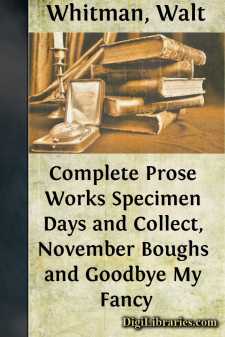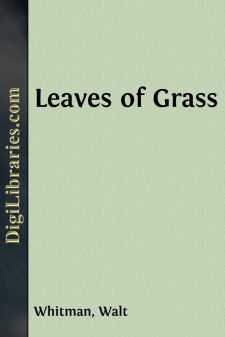Categories
- Antiques & Collectibles 13
- Architecture 36
- Art 48
- Bibles 22
- Biography & Autobiography 813
- Body, Mind & Spirit 142
- Business & Economics 28
- Children's Books 15
- Children's Fiction 12
- Computers 4
- Cooking 94
- Crafts & Hobbies 4
- Drama 346
- Education 46
- Family & Relationships 57
- Fiction 11828
- Games 19
- Gardening 17
- Health & Fitness 34
- History 1377
- House & Home 1
- Humor 147
- Juvenile Fiction 1873
- Juvenile Nonfiction 202
- Language Arts & Disciplines 88
- Law 16
- Literary Collections 686
- Literary Criticism 179
- Mathematics 13
- Medical 41
- Music 40
- Nature 179
- Non-Classifiable 1768
- Performing Arts 7
- Periodicals 1453
- Philosophy 64
- Photography 2
- Poetry 896
- Political Science 203
- Psychology 42
- Reference 154
- Religion 513
- Science 126
- Self-Help 84
- Social Science 81
- Sports & Recreation 34
- Study Aids 3
- Technology & Engineering 59
- Transportation 23
- Travel 463
- True Crime 29
Drum Taps
by: Walt Whitman
Description:
Excerpt
INTRODUCTION
When the first days of August loured over the world, time seemed to stand still. A universal astonishment and confusion fell, as upon a flock of sheep perplexed by strange dogs. But now, though never before was a St. Lucy's Day so black with "absence, darkness, death," Christmas is gone. Spring comes swiftly, the almond trees flourish. Easter will soon be here. Life breaks into beauty again and we realize that man may bring hell itself into the world, but that Nature ever patiently waits to be his natural paradise. Yet still a kind of instinctive blindness blots out the prospect of the future. Until the long horror of the war is gone from our minds, we shall be able to think of nothing that has not for its background a chaotic darkness. Like every obsession, it gnaws at thought, follows us into our dreams and returns with the morning. But there have been other wars. And humanity, after learning as best it may their brutal lesson, has survived them. Just as the young soldier leaves home behind him and accepts hardship and danger as to the manner born, so, when he returns again, life will resume its old quiet wont. Nature is not idle even in the imagination. It is man's salvation to forget no less than it is his salvation to remember. And it is wise even in the midst of the conflict to look back on those that are past and to prepare for the returning problems of the future.
When Whitman wrote his "Democratic Vistas," the long embittered war between the Northern and Southern States of America was a thing only of yesterday. It is a headlong amorphous production—a tangled meadow of "leaves of grass" in prose. But it is as cogent to-day as it was when it was written:
To the ostent of the senses and eyes [he writes], the influences which stamp the world's history are wars, uprisings, or downfalls of dynasties…. These, of course, play their part; yet, it may be, a single new thought, imagination, abstract principle … put in shape by some great literatus, and projected among mankind, may duly cause changes, growths, removals, greater than the longest and bloodiest war, or the most stupendous merely political, dynastic, or commercial overturn.
The literatus who realized this had his own message in mind. And yet, justly. For those who might point to the worldly prosperity and material comforts of his country, and ask, Are not these better indeed than any utterances even of greatest rhapsodic, artist, or literatus? he has his irrefutable answer. He surveys the New York of 1870, "its façades of marble and iron, of original grandeur and elegance of design," etc., in his familiar catalogical jargon, and shutting his eyes to its glow and grandeur, inquires in return, Are there indeed men here worthy the name? Are there perfect women? Is there a pervading atmosphere of beautiful manners? Are there arts worthy freedom and a rich people? Is there a great moral and religious civilization—the only justification of a great material one? We ourselves in good time shall have to face and to answer these questions....





